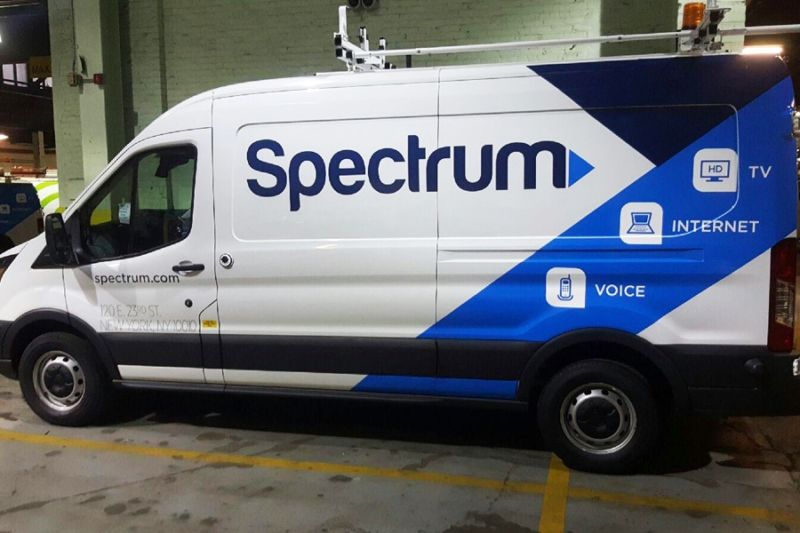
Charter Communications will spend nearly $2 billion less on capital improvements to its Spectrum cable network and services this year, despite raising TV and broadband prices—and despite Ajit Pai’s claims that repealing net neutrality rules would boost capital investment.
“We currently expect capital expenditures, excluding capital expenditures related to mobile, to be approximately $7 billion in 2019, versus $8.9 billion in 2018,” Charter wrote in an earnings announcement today. “Our expectation for lower capital expenditures in 2019 versus 2018 is primarily driven by our expectation for lower customer premise equipment spend with the completion of our all-digital conversion [and] lower scalable infrastructure spend with the completion of the rollout of DOCSIS 3.1 technology across our footprint.” Charter’s costs are also going down because it has largely finished integrating Time Warner Cable and Bright House, after buying the cable companies in 2016.
“2019 is the year we’ll see a significant reduction in capital intensity,” Charter CEO Tom Rutledge said in an earnings call today, according to a Seeking Alpha transcript. A year ago, Charter executives promised investors “a meaningful decline in capital intensity” in 2019.
Charter said its cable capital spending as a percentage of cable revenue already went down, from 20.9 percent in 2017 to 20.4 percent in 2018. That percentage should go down further this year as Charter lowers cable capital costs and increases revenue.
Charter raised prices in November
Despite the expected decrease in costs, Charter raised prices throughout its 41-state cable territory in November. The price hikes affect both broadband and cable TV service and could amount to $91 extra per year for individual customers who buy both.
Charter said its cable revenue per residential customer was $111.78 a month in the fourth quarter, up 0.9 percent from the previous year. Charter said that “promotional rate step-ups and modest rate adjustments”—price increases, in other words—helped offset the fact that many customers purchase only Internet service and thus aren’t paying for TV.
Charter told Ars in October that its new price hike “reflects the dramatically faster speeds and investments we’ve made in reliability and quality.”
But the speed increases in 2018 were achieved without a major increase in capital spending. Charter’s total capital spending for 2018 was $9.1 billion, including $242 million in costs for its new mobile service, up from $8.7 billion in 2017. Charter is a reseller of Verizon network capacity, so it isn’t actually building its own mobile network. But it spent money on back-office systems and retail store upgrades in order to launch the mobile service in June 2018.
Pai predicted capital-spending increase
Charter’s plan to lower capital spending in 2019 conflicts with Federal Communications Commission Chairman Ajit Pai’s claim that repealing net neutrality rules would cause ISPs to raise broadband capital spending. As net neutrality advocates have frequently said (and as ISPs have admitted to investors), broadband capital spending wasn’t affected by the Obama-era net neutrality rules that were repealed by Pai.
Capital spending rises and falls based on business needs and technology upgrade cycles, such as the DOCSIS 3.1 rollout mentioned by Charter. Despite Pai’s statements that net neutrality rules lowered investment, Charter raised its capital investment in 2017 while the rules were in place.
As we reported last week, Comcast’s cable division spent $7.95 billion on capital expenditures during calendar year 2017, but that fell to $7.72 billion in the 12 months ending on December 31, 2018.
Despite Charter raising speeds in its network, New York government officials say Charter hasn’t met broadband expansion requirements that it agreed to in order to get the state’s permission to buy Time Warner Cable. US Rep. Anthony Brindisi (D-N.Y.) this week asked the FCC “to hold Charter/Spectrum accountable.”
Since the Charter/Time Warner Cable merger, “hundreds of my constituents have contacted me to share stories of exorbitant rate increases,” Brindisi told Pai in a letter. “Some people who were paying just over $100 a month for cable and Internet service were paying about $200 a month for the same service just two years later. For working families and seniors living on a fixed income, these rate increases are unacceptable.”
Charter’s yearly revenue rose from $41.6 billion in 2017 to $43.6 billion in 2018. Net income decreased from $9.9 billion to $1.2 billion, but Charter said this drop “was primarily driven by a GAAP tax benefit from a reduction in the deferred tax liability as a result of Federal tax reform in 2017.”
Charter is the only high-speed home broadband choice for 38 million Americans, making it difficult for Internet customers to switch in response to price increases, a recent study found. Some cable TV customers are dropping the service in favor of online streaming options, however. Charter’s total video customer base dropped from 16.4 million at the end of 2017 to 16.1 million at the end of 2018, while its broadband subscriber base rose from 22.5 million to 23.6 million in the same 12-month period.
Disclosure: The Advance/Newhouse Partnership, which owns 13 percent of Charter, is part of Advance Publications. Advance Publications owns Condé Nast, which owns Ars Technica.
https://arstechnica.com/?p=1449329

